Damn you, Rakugo – how the hell am I supposed to blog that?
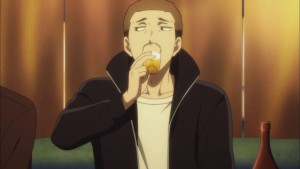 We’ve been down this road before, Kids, but I once more start off a Shouwa Genroku Rakugo Shinjuu post not knowing how in the world I’m going to write it. There’s a lot you want to say after a tour de force like that, obviously, but it’s hard to give form to it. And a lot of it is breathless praise, anyway, which seems pretty redundant – I mean, those viewers who’ve stuck with the series this long obviously know it’s a masterpiece. So what does that leave for a scribbler like me?
We’ve been down this road before, Kids, but I once more start off a Shouwa Genroku Rakugo Shinjuu post not knowing how in the world I’m going to write it. There’s a lot you want to say after a tour de force like that, obviously, but it’s hard to give form to it. And a lot of it is breathless praise, anyway, which seems pretty redundant – I mean, those viewers who’ve stuck with the series this long obviously know it’s a masterpiece. So what does that leave for a scribbler like me?
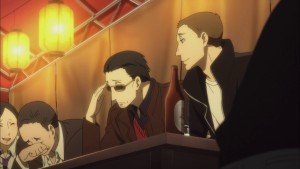 One thing I will say – I took a lot of notes this week. Those of you who’ve been with me for a while know that both a long sheath of episode notes and an empty notepad can be signs that I found an episode to be great, but it’s definitely the former here. This episode was just so incredibly dense – so packed with memorable imagery and deep emotional resonance and symbolism. Writing down my thoughts was the only way I could think to try and come to grips with them – this was not a meditation so much as a graduate-level class in masterful storytelling.
One thing I will say – I took a lot of notes this week. Those of you who’ve been with me for a while know that both a long sheath of episode notes and an empty notepad can be signs that I found an episode to be great, but it’s definitely the former here. This episode was just so incredibly dense – so packed with memorable imagery and deep emotional resonance and symbolism. Writing down my thoughts was the only way I could think to try and come to grips with them – this was not a meditation so much as a graduate-level class in masterful storytelling.
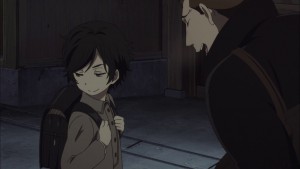 First off, the news that the Yakuza Boss has been sentenced to six (and a half) years in prison – the same prison where Yakumo did a performance of “Shinigami” which inspired the young Yotarou to follow the path of rakugo. This will prove to be very important – Shouwa Genroku is a show which loves to double back on itself, its narrative a chronological ouroboros. But first, a trip to the sento – a place where important stuff always seems to happen in anime, and this time was no exception.
First off, the news that the Yakuza Boss has been sentenced to six (and a half) years in prison – the same prison where Yakumo did a performance of “Shinigami” which inspired the young Yotarou to follow the path of rakugo. This will prove to be very important – Shouwa Genroku is a show which loves to double back on itself, its narrative a chronological ouroboros. But first, a trip to the sento – a place where important stuff always seems to happen in anime, and this time was no exception.
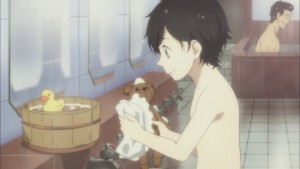 Rakugo really fooled me here – I was believing for a while that this might be one of those upbeat and hopeful episodes. Kikuhiko seemed to have regained a bit of his edge, and the presence of little Shin (now an elementary schooler) always manages to lift the mood of the story. I absolutely loved Hatakeyama-sensei’s direction here, with the quick cuts between Yotarou and Bon, and to Shinnosuke (while dutifully washing himself), discreetly observing both of them like a hawk. The sense of a sharp young mind trying to grasp the ways of adults was palpable here, and Yotarou and Yakumo were so delightfully themselves. Guileless Yota’s declaration that his master was “the one thing in this world that’s rock solid to me” carries so much weight behind it – you can see the way Yakumo feels it as a burden, while at the same time being humbled and touched by it.
Rakugo really fooled me here – I was believing for a while that this might be one of those upbeat and hopeful episodes. Kikuhiko seemed to have regained a bit of his edge, and the presence of little Shin (now an elementary schooler) always manages to lift the mood of the story. I absolutely loved Hatakeyama-sensei’s direction here, with the quick cuts between Yotarou and Bon, and to Shinnosuke (while dutifully washing himself), discreetly observing both of them like a hawk. The sense of a sharp young mind trying to grasp the ways of adults was palpable here, and Yotarou and Yakumo were so delightfully themselves. Guileless Yota’s declaration that his master was “the one thing in this world that’s rock solid to me” carries so much weight behind it – you can see the way Yakumo feels it as a burden, while at the same time being humbled and touched by it.
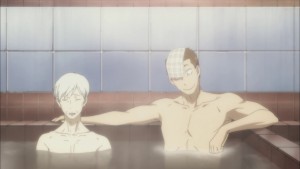 There’s a lot of beautiful contrast here. Hard and brittle Kikuhiko is hopelessly tangled in the bonds of affection (believe me, we’ll get back to that). He loves Yotarou and Shinnosuke, make no mistake about it (and Konatsu too of course). And Shin… It’s fascinating to watch him ply his charm to manipulate adults – it’s both innocent and calculated. He knows exactly what he’s doing, yet hasn’t made the connection yet that it’s underhanded – it’s just a natural thing for him. This is what’s fascinating about Yotarou of course – he’s the one character in this cast who seems not to be a mess of contrasts. But he and Shin are pushing for the same thing, in their very different ways – to get the old man back on stage. And the chosen venue is that prison, where Yota encourages him to finish the story the boss never got to hear the end of.
There’s a lot of beautiful contrast here. Hard and brittle Kikuhiko is hopelessly tangled in the bonds of affection (believe me, we’ll get back to that). He loves Yotarou and Shinnosuke, make no mistake about it (and Konatsu too of course). And Shin… It’s fascinating to watch him ply his charm to manipulate adults – it’s both innocent and calculated. He knows exactly what he’s doing, yet hasn’t made the connection yet that it’s underhanded – it’s just a natural thing for him. This is what’s fascinating about Yotarou of course – he’s the one character in this cast who seems not to be a mess of contrasts. But he and Shin are pushing for the same thing, in their very different ways – to get the old man back on stage. And the chosen venue is that prison, where Yota encourages him to finish the story the boss never got to hear the end of.
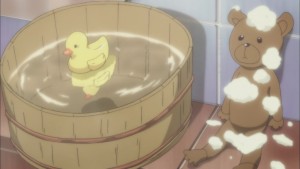 There are plenty of hints that things are going to take a dark turn – not least Kikuhiko’s declaration that his one wish is to die doing rakugo. And then there’s the prominence of “Shinigami”, obviously an ominous theme generally but certainly where it comes to the rakugo, which is bleak and chilling. There are no coincidences in Shouwa Genroku and Bon performing at the prison again is both a callback to his meeting with Yo-chan and a reflection of his current state of mind. Perform he does – and as weakened as age and illness have made him, he channels that frailty into raw emotional power. This is the perfect rakugo for this version of Yakumo, and it moves not just the prisoners and their guards but even Konatsu (who sings the part of the doomed geisha Koito, though Kikuhiko hears Miyokichi’s voice) to tears. The way the old master uses his fan as a prop in this piece ie especially stunning. And the snow – my God, the snow…
There are plenty of hints that things are going to take a dark turn – not least Kikuhiko’s declaration that his one wish is to die doing rakugo. And then there’s the prominence of “Shinigami”, obviously an ominous theme generally but certainly where it comes to the rakugo, which is bleak and chilling. There are no coincidences in Shouwa Genroku and Bon performing at the prison again is both a callback to his meeting with Yo-chan and a reflection of his current state of mind. Perform he does – and as weakened as age and illness have made him, he channels that frailty into raw emotional power. This is the perfect rakugo for this version of Yakumo, and it moves not just the prisoners and their guards but even Konatsu (who sings the part of the doomed geisha Koito, though Kikuhiko hears Miyokichi’s voice) to tears. The way the old master uses his fan as a prop in this piece ie especially stunning. And the snow – my God, the snow…
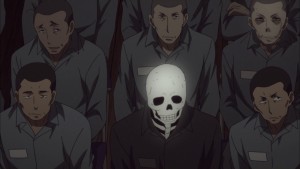 From there, the story stays focused on rakugo, as Yakumo finally goes to see Yotarou perform “Inokori”. As expected, he disapproves of his protege’s respectful approach, seeing the lack of interpretation as dumbing the material down for the audience. My favorite part of this sequence, actually, is when Yakumo finally acknowledges Hii-sensei as he leaves the performance – and that ties in with his instruction to give his “Sukeroku” fan to the current incarnation. That’s both an acknowledgement that as flawed as he sees Yotarou’s rakugo to be, Yakumo can’t change it, and that the old master feels he’s not going to need that fan anymore.
From there, the story stays focused on rakugo, as Yakumo finally goes to see Yotarou perform “Inokori”. As expected, he disapproves of his protege’s respectful approach, seeing the lack of interpretation as dumbing the material down for the audience. My favorite part of this sequence, actually, is when Yakumo finally acknowledges Hii-sensei as he leaves the performance – and that ties in with his instruction to give his “Sukeroku” fan to the current incarnation. That’s both an acknowledgement that as flawed as he sees Yotarou’s rakugo to be, Yakumo can’t change it, and that the old master feels he’s not going to need that fan anymore.
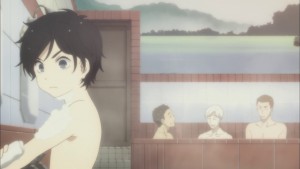 The sight of Yakumo performing “Shinigami” to an ancient theater full of empty seats is one that’s going to stay with me for a long time. By this point it’s clear what the old man is planning – this has all been carefully orchestrated in his mind. And when the second Sukeroku appears with red eyes, the die is surely cast. As hard as he is on himself, to see Kikuhiko in his current state perform “Shinigami” is a repudiation of the idea that his rakugo is no longer relevant, but in his own eyes the master is finished, broken. One can interpret the mysticism in this series in any number of ways, but I tend to believe these are Bon’s own demons tormenting him, given form by his guilt and his desire to see those departed ones again (and to be punished by them).
The sight of Yakumo performing “Shinigami” to an ancient theater full of empty seats is one that’s going to stay with me for a long time. By this point it’s clear what the old man is planning – this has all been carefully orchestrated in his mind. And when the second Sukeroku appears with red eyes, the die is surely cast. As hard as he is on himself, to see Kikuhiko in his current state perform “Shinigami” is a repudiation of the idea that his rakugo is no longer relevant, but in his own eyes the master is finished, broken. One can interpret the mysticism in this series in any number of ways, but I tend to believe these are Bon’s own demons tormenting him, given form by his guilt and his desire to see those departed ones again (and to be punished by them).
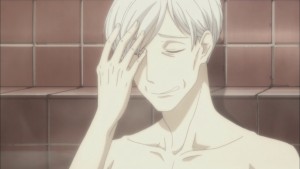 But not even flame can cleanse Kikuhiko of the conflict within him. To die doing rakugo, and in Shin’s (and let us remember, “Shin” means “death”) arms – surely, this was everything he wanted? And to burn down rakugo’s faded, gloriously humble main shrine is surely a symbolic fulfillment of Bon’s pledge to take rakugo with him. But even here, he can’t let go. As Shin’s spectre jibes him with, he’s hopelessly entangled by affection – his “great weakness”. Affection for rakugo, for his family, and ultimately for life – these things are stronger than Yakumo’s desire to let go. And it’s Yotarou, of course, who’s there to offer him a literal hand up out of the fires of hell – Yotarou, who only knows how to move in one direction, forward.
But not even flame can cleanse Kikuhiko of the conflict within him. To die doing rakugo, and in Shin’s (and let us remember, “Shin” means “death”) arms – surely, this was everything he wanted? And to burn down rakugo’s faded, gloriously humble main shrine is surely a symbolic fulfillment of Bon’s pledge to take rakugo with him. But even here, he can’t let go. As Shin’s spectre jibes him with, he’s hopelessly entangled by affection – his “great weakness”. Affection for rakugo, for his family, and ultimately for life – these things are stronger than Yakumo’s desire to let go. And it’s Yotarou, of course, who’s there to offer him a literal hand up out of the fires of hell – Yotarou, who only knows how to move in one direction, forward.
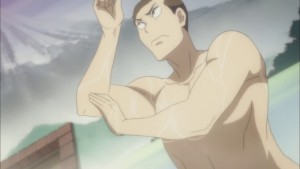 We’ve reached a point in the story where I’m perhaps less sure where it will go than ever before. Has this fire purified Kikuhiko in some way – perhaps given him serenity? I don’t know – there will be real shame attached to this for the old master. Another breakdown, the destruction of a beloved temple of rakugo. And really, at this point is there any compelling reason for Kikuhiko to return to the stage? It may be time for us to see the passing of the torch begin in earnest. Perhaps it will be Shinnosuke’s love of rakugo that provides the impetus for Yakumo to reconsider his resolve that it should die with him – and perhaps in the act of passing it on willingly, Yakumo might find something in the twilight of his life to give him a little inner peace at last.
We’ve reached a point in the story where I’m perhaps less sure where it will go than ever before. Has this fire purified Kikuhiko in some way – perhaps given him serenity? I don’t know – there will be real shame attached to this for the old master. Another breakdown, the destruction of a beloved temple of rakugo. And really, at this point is there any compelling reason for Kikuhiko to return to the stage? It may be time for us to see the passing of the torch begin in earnest. Perhaps it will be Shinnosuke’s love of rakugo that provides the impetus for Yakumo to reconsider his resolve that it should die with him – and perhaps in the act of passing it on willingly, Yakumo might find something in the twilight of his life to give him a little inner peace at last.


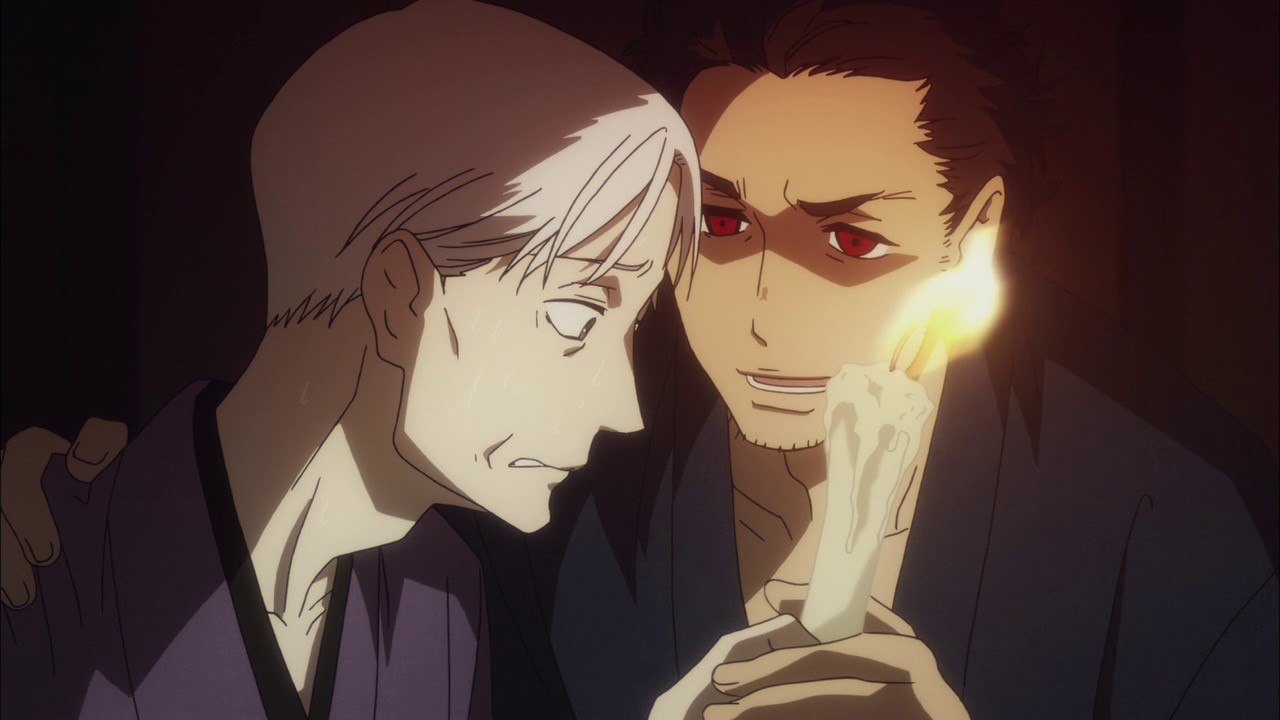
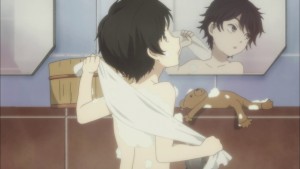
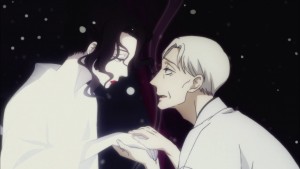
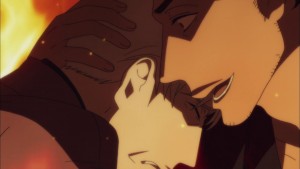
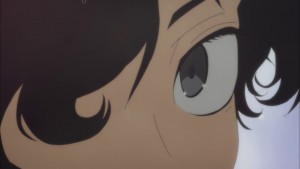
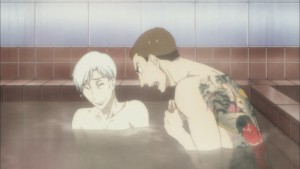
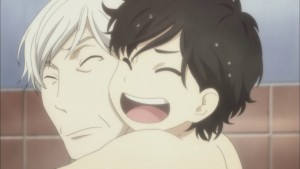
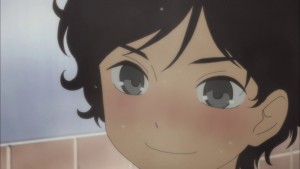
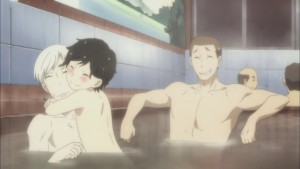
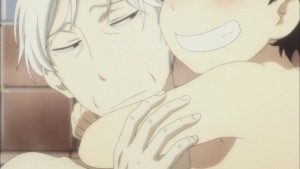
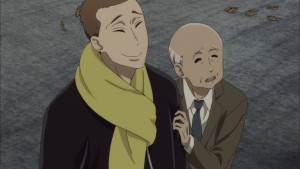
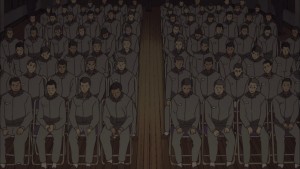
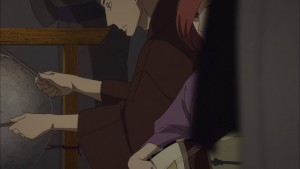
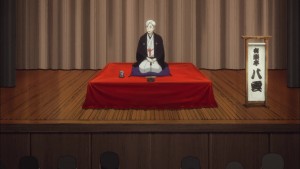
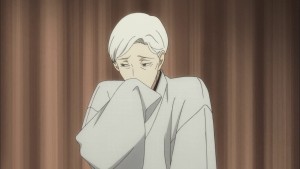
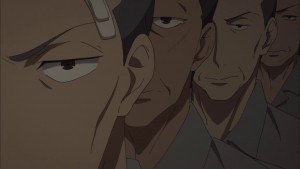
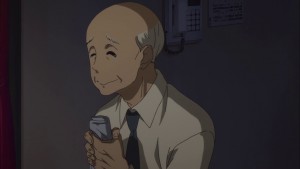
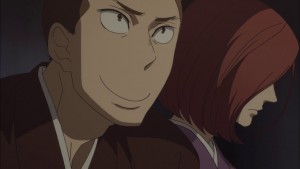
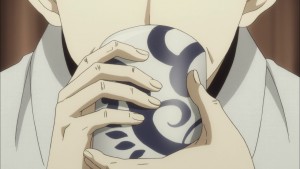
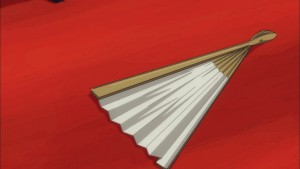
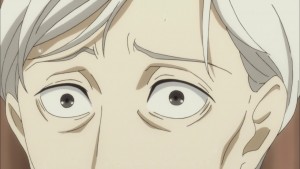
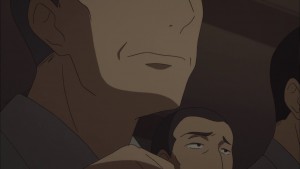
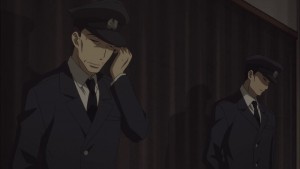
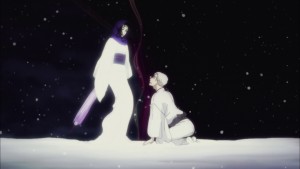
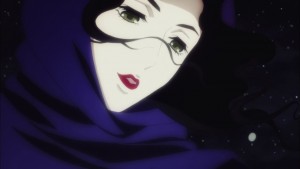
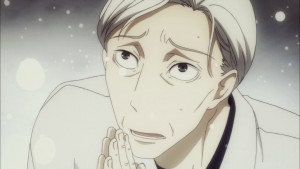
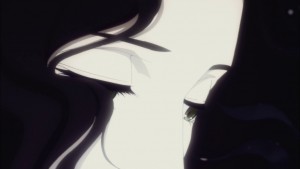
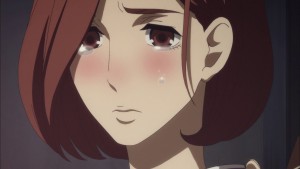
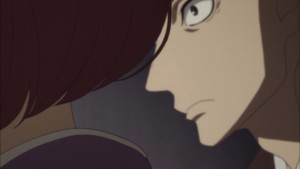
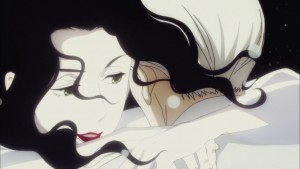
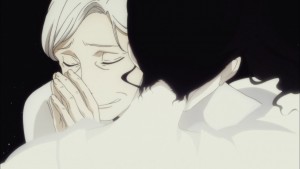
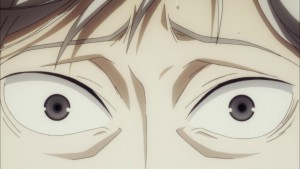
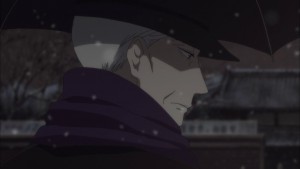
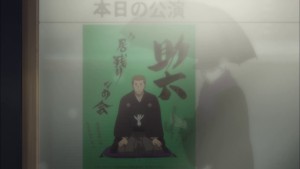
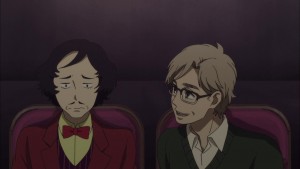
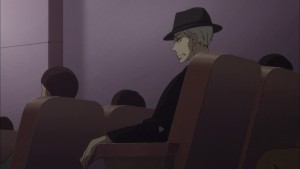
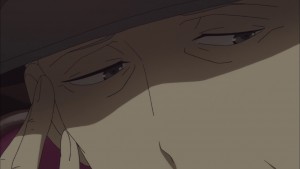
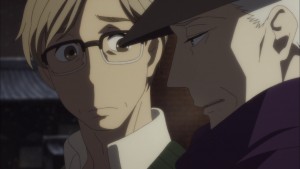
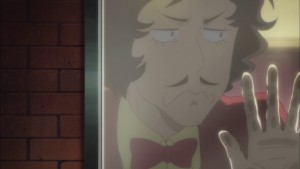
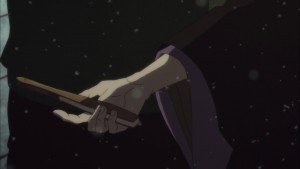
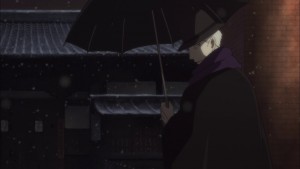
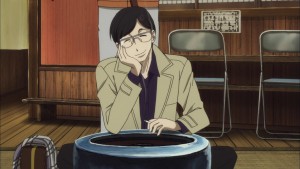
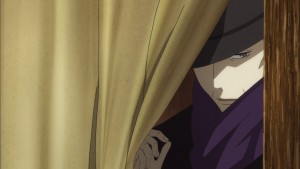
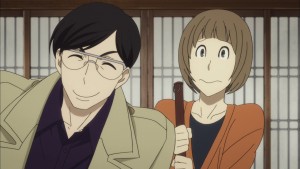
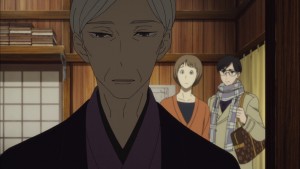
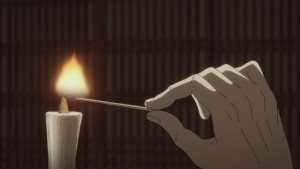
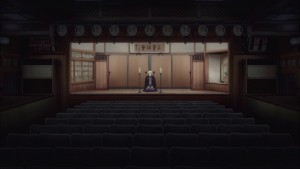
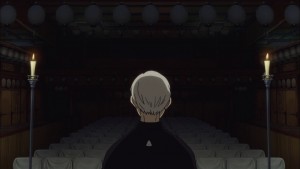
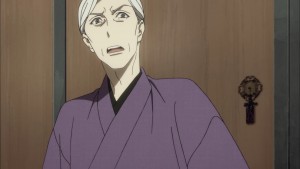
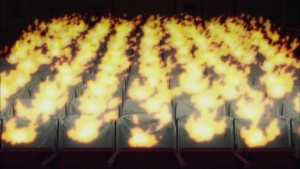
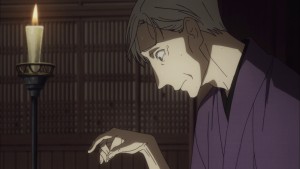
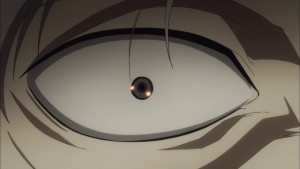
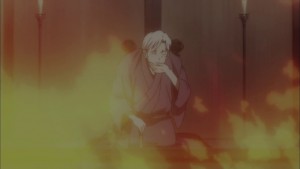
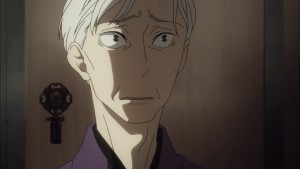
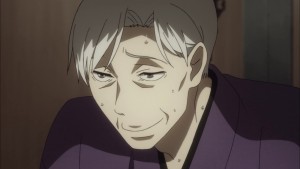
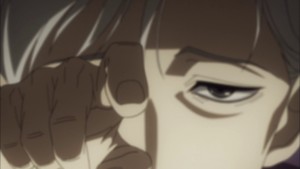
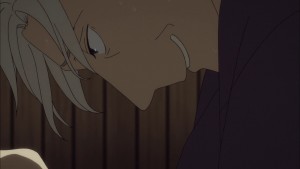
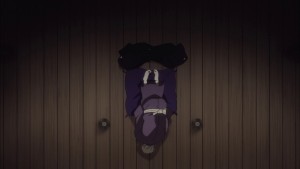
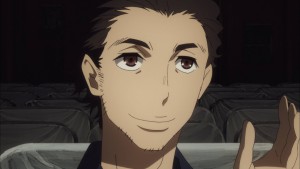
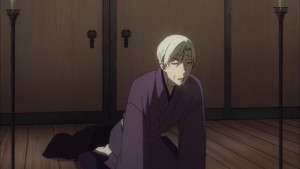
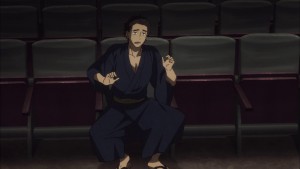
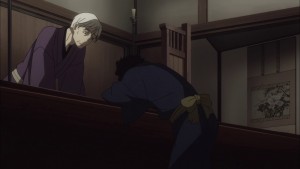
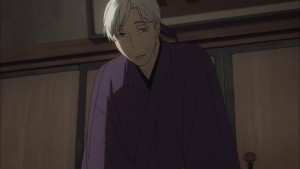
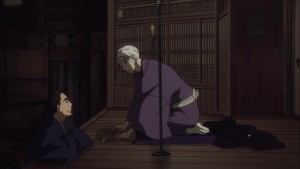
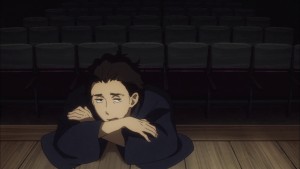
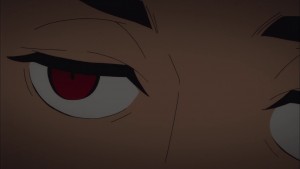
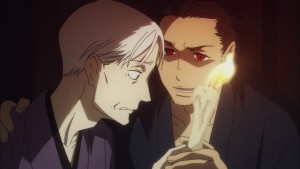
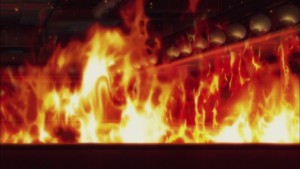
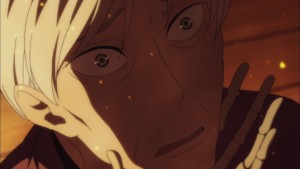
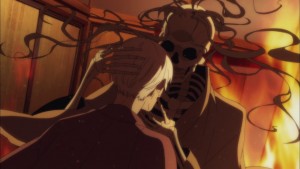
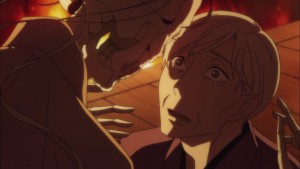
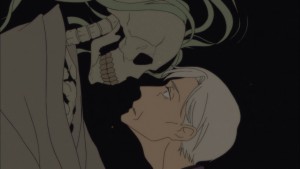
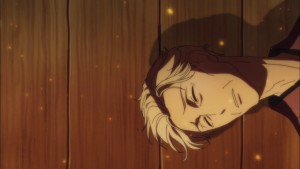
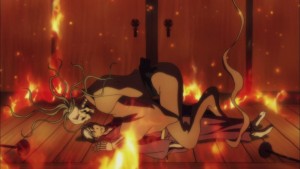
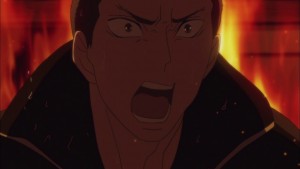
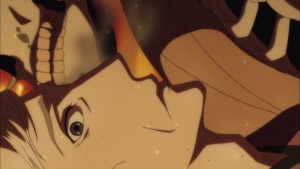
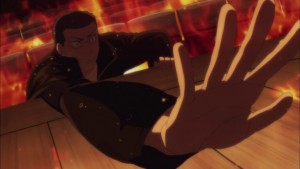
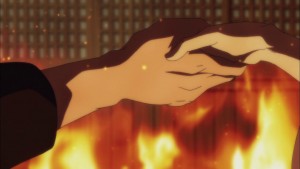
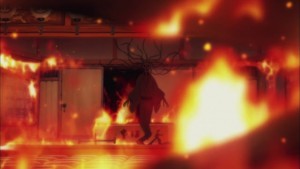
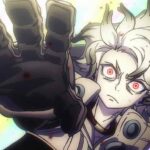
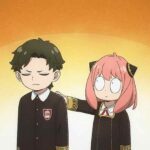
HoTaRu
March 4, 2017 at 12:41 amI’ve gone without commenting on this show for a while because truthfully I’ve found it impossible to put all of my thoughts down in a way that would adequately describe all of my feelings concerning it. I’ve felt that you encapsulate most of what I might say already in these reviews, which BTW are my favorite reviews from you since I’ve been coming to your blog. While it would be hard for me to pinpoint an exact favorite episode from this series, this week’s episode certainly gets close to the winning spot. I have been consistently blown away by this show for obvious reasons and I doubt I will see anything to equal it anytime soon. Somehow they have managed to create a second season that is surpassing the first, something I didn’t think could be possible considering just how much I loved the first season. This episode in particular was flawless and made me cry from the combination of emotion, imagery, and phenomenal voice acting. Up till now I can usually pinpoint the scene that leaves me breathless. This entire episode was that for me.
Guardian Enzo
March 4, 2017 at 8:08 amThank you for that kind comment. I heartily agree that the second season has surpassed the first – pretty much every episode has been a masterpiece. Consistency doesn’t begin to cover it.
Zilla
March 4, 2017 at 6:51 amI have no words. I am a quivering, whimpering ball of emotion.
JJ
March 4, 2017 at 7:55 amThe plaudits will rightly go to Yakumo’s performances, but for me the defining moment of the episode was Konatsu’s tear falling on the shamisen string. It is a perfect demonstration of the masterful direction Rakugo has shown, as no words were needed to make apparent the well of conflicting emotions Konatsu has towards Kikuhiko.
If the series continues as it has so far (and I see no reason to think different), we’ve got an all-time great on our hands.
DP
March 4, 2017 at 12:28 pmI’m obviously very much in the minority on this, but while I agree that the directing and acting are both terrific, I think the writing and plotting are decidedly second-rate (and I felt that way about the first season, as well). For me, Rakugo’s unbelievably maudlin melodrama is absolutely swamping its artistry. I don’t hate the show by any means, but it’s absolutely leaving me ice cold. This is a show I respect, but don’t really like at all.
Christine
March 6, 2017 at 1:34 pmSomeone give Ishida all of the awards for his work in SGRS. The writing and direction deserve a lot of credit, too, but Ishida’s performance communicates such a nuanced character who is also a very capable performer, AND he manages to portray him from his apprenticeship to his golden years all the way until his post-stroke period. I’m not even going into his consistent yet organic performance of Yakumo’s “when will I stop feeling this constant sense of despair and exhaustion at the idea of having to keep on living?” Basically this show is screwing the curve for everyone, not just the Winter 2017 season.